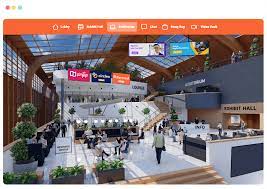Title: Exploring the Benefits of Virtual Expo Platforms
Introduction:
In recent years, the world has witnessed a significant shift in the way we conduct business events and exhibitions. With advancements in technology, virtual expo platforms have emerged as a game-changer, revolutionizing the way companies connect with their target audience. In this article, we will delve into the benefits of virtual expo platforms and explore how they are reshaping the landscape of business events.
Global Accessibility:
One of the key advantages of virtual expo platforms is their ability to transcend geographical boundaries. Unlike traditional physical expos, virtual platforms allow participants from around the globe to access and engage with exhibitors and attendees without the need for travel expenses or time constraints. This global accessibility opens up new avenues for networking and collaboration on an international scale.
Cost-Effectiveness:
Hosting a physical expo can be an expensive endeavor, involving costs such as venue rental, logistics, booth construction, and staffing. Virtual expo platforms eliminate many of these costs by providing a digital space where exhibitors can showcase their products or services at a fraction of the cost. This cost-effectiveness makes virtual expos an attractive option for businesses of all sizes, including startups and small enterprises.
Enhanced Analytics and Data Insights:
Virtual expo platforms offer robust analytics tools that provide valuable insights into attendee behavior, engagement levels, and lead generation. Exhibitors can track metrics such as booth visits, session attendance, downloads, and interactions to measure their event’s success and make data-driven decisions for future marketing strategies. These analytics empower businesses to optimize their participation in virtual expos for maximum return on investment.
Flexibility and Customization:
Virtual expo platforms offer unparalleled flexibility when it comes to customization options. Exhibitors can design their digital booths according to their branding guidelines, incorporating interactive elements like videos, product demos, live chats, or webinars to engage with visitors effectively. This flexibility allows businesses to create immersive experiences tailored to their target audience, enhancing brand visibility and customer engagement.
Extended Event Duration:
Unlike physical expos that typically last for a few days, virtual expo platforms often extend the event duration, allowing attendees to access the content and exhibitor information for an extended period. This prolonged exposure ensures that businesses have a greater opportunity to connect with potential customers even after the live event has ended. Attendees can revisit booths, download resources, and continue networking at their convenience, maximizing lead generation opportunities.
Conclusion:
Virtual expo platforms have emerged as a transformative solution in the world of business events. With their global accessibility, cost-effectiveness, enhanced analytics capabilities, flexibility, and extended event duration, they offer numerous advantages over traditional physical expos. As technology continues to advance, virtual expo platforms will likely become an integral part of the exhibition landscape, providing businesses with new avenues for growth and connection in an increasingly digital world.
Frequently Asked Questions about Virtual Expo Platforms
- What is the best platform for virtual event?
- How do I run a virtual expo?
- What is the virtual event platform for an Expo?
- What is ExpoPlatform?
Choosing the best platform for a virtual event depends on several factors, including your specific needs, budget, and the nature of your event. Here are a few popular platforms known for their features and capabilities:
- Zoom: Zoom is a widely recognized video conferencing platform that offers various features such as breakout rooms, screen sharing, and interactive chat options. While primarily used for meetings and webinars, it can also be utilized for smaller virtual events.
- Microsoft Teams: Microsoft Teams is another comprehensive communication and collaboration platform that offers features like video conferencing, chat functionality, file sharing, and integration with other Microsoft Office tools. It is suitable for both small-scale virtual events and larger conferences.
- Hopin: Hopin is a dedicated virtual event platform that provides a range of features including live streaming, networking opportunities, interactive booths, breakout sessions, Q&A sessions, and more. It offers a comprehensive solution for hosting large-scale virtual conferences or trade shows.
- Eventbrite: Eventbrite is primarily known as a ticketing platform but also offers virtual event management capabilities. It allows you to create custom event pages, manage registrations, sell tickets (if applicable), and host live or pre-recorded sessions during your virtual event.
- Attendify: Attendify is an all-in-one event management platform that enables you to create engaging virtual experiences. It provides features like live streaming, interactive sessions with polls and surveys, networking opportunities through chat or video calls, gamification elements to boost attendee engagement, and analytics to measure event success.
Remember to thoroughly evaluate each platform based on your specific requirements before making a decision. Consider factors such as attendee capacity limits, technical support availability, ease of use for both organizers and attendees, customization options, security measures in place (e.g., encryption), pricing structure (including any additional fees), and integration capabilities with other tools you may need for your event (e.g., registration systems, CRM software).
How do I run a virtual expo?
Running a virtual expo requires careful planning and execution. Here are some steps to help you get started:
- Define Your Objectives: Determine the purpose and goals of your virtual expo. Are you looking to generate leads, showcase products, or educate attendees? Clearly defining your objectives will guide your planning process.
- Choose a Virtual Expo Platform: Research and select a virtual expo platform that aligns with your needs. Consider factors such as features, scalability, customization options, and pricing. Popular platforms include vFairs, 6Connex, and Hopin.
- Plan Your Event Structure: Decide on the format and structure of your virtual expo. Will it be a one-day event or span multiple days? Identify the sessions, workshops, or webinars you want to include and create a schedule that accommodates different time zones if your target audience is global.
- Design Engaging Booths: Work with your exhibitors to create visually appealing and interactive digital booths. Encourage them to include product demos, videos, downloadable resources, live chat options, and appointment scheduling features to engage attendees effectively.
- Promote Your Virtual Expo: Develop a comprehensive marketing strategy to generate buzz around your event. Utilize social media platforms, email marketing campaigns, industry partnerships, and targeted advertising to reach your desired audience. Highlight the unique aspects of attending a virtual expo such as cost savings and global accessibility.
- Provide Technical Support: Ensure that you have a dedicated support team available throughout the event to address any technical issues that may arise for exhibitors or attendees. Conduct thorough testing before the event to identify any potential glitches or connectivity problems.
- Facilitate Networking Opportunities: Incorporate networking features into your virtual expo platform to encourage interaction between exhibitors and attendees. This could include live chat rooms, one-on-one video meetings, or group discussions where participants can connect with each other.
- Capture Analytics and Feedback: Utilize the analytics tools provided by your virtual expo platform to track attendee engagement, booth visits, and lead generation. Gather feedback from exhibitors and attendees to understand their experience and identify areas for improvement.
- Follow-Up and Nurture Leads: After the virtual expo, follow up with leads generated during the event. Provide additional information, schedule meetings, or offer exclusive discounts to maintain their interest and convert them into customers.
- Evaluate Success and Learn: Analyze the data collected from your virtual expo to evaluate its success against your objectives. Identify what worked well and areas that need improvement. Use these insights to refine your strategy for future virtual expos.
Remember, running a virtual expo requires adaptability and creativity. Stay abreast of emerging technologies and trends in the virtual events space to continually enhance the experience for exhibitors and attendees alike.
A virtual event platform for an expo is a digital platform that replicates the experience of a physical expo in an online environment. It serves as a virtual venue where exhibitors can showcase their products or services, and attendees can explore, interact, and engage with the exhibitors and other participants.
These platforms typically offer a variety of features and tools to create an immersive and interactive experience. Some common features include:
- Virtual Booths: Exhibitors have their dedicated digital booths where they can display their products, services, videos, brochures, and other promotional materials. Attendees can visit these booths to gather information, interact with representatives through live chats or video calls, and even request demos.
- Networking Opportunities: Virtual event platforms provide networking features such as chat rooms, discussion forums, or one-on-one video meetings. These facilitate connections between attendees, exhibitors, sponsors, and speakers to foster meaningful interactions and collaborations.
- Live Presentations and Webinars: Platforms often offer the ability to host live presentations or webinars where exhibitors can showcase their expertise or launch new products/services. Attendees can participate in real-time Q&A sessions or engage in interactive polls during these sessions.
- Content Sharing: Exhibitors can upload various types of content such as videos, documents, presentations, or case studies for attendees to access and download. This allows for easy dissemination of information and resources.
- Analytics and Reporting: Virtual event platforms provide analytics tools that track attendee engagement metrics such as booth visits, session attendance rates, downloads made by attendees, etc. These insights help exhibitors measure the success of their participation and make informed decisions for future events.
- Gamification: Some platforms incorporate gamification elements like leaderboards or challenges to incentivize attendee participation and engagement. This adds an element of fun while encouraging attendees to explore different features within the virtual expo environment.
Overall, virtual event platforms aim to replicate the benefits of physical expos, such as networking, lead generation, and brand exposure, in a digital setting. They offer convenience, cost-effectiveness, and global accessibility while providing a rich and interactive experience for both exhibitors and attendees.
ExpoPlatform is a comprehensive virtual event platform that facilitates the hosting and management of virtual exhibitions, conferences, trade shows, and other business events. It offers a wide range of features and tools designed to create engaging and interactive virtual experiences for exhibitors and attendees alike.
ExpoPlatform provides a user-friendly interface that allows event organizers to easily set up and customize their virtual events. The platform offers various modules that can be tailored to meet specific event requirements, including virtual booths, networking lounges, auditoriums for live sessions or webinars, chat functionalities, and more.
For exhibitors, ExpoPlatform offers customizable digital booths where they can showcase their products or services through videos, brochures, presentations, and other multimedia content. Exhibitors can engage with attendees through live chats or video calls, collect leads, schedule meetings, and even conduct product demonstrations.
Attendees benefit from the platform’s interactive features that enable networking opportunities with other participants. They can explore virtual exhibition halls, visit exhibitor booths, attend live sessions or webinars featuring industry experts or keynote speakers. Attendees can also interact with exhibitors through real-time chats or request one-on-one meetings.
ExpoPlatform also incorporates advanced analytics tools that provide valuable insights into attendee engagement levels, booth visits, session attendance rates, lead generation metrics, and more. These analytics help event organizers and exhibitors measure the success of their virtual events and make data-driven decisions for future marketing strategies.
Overall, ExpoPlatform offers a comprehensive solution for hosting virtual events by providing a user-friendly interface for organizers while delivering engaging experiences for both exhibitors and attendees. Its features promote networking opportunities, seamless information sharing between participants, and valuable data insights to maximize the impact of virtual events in today’s digital landscape.





